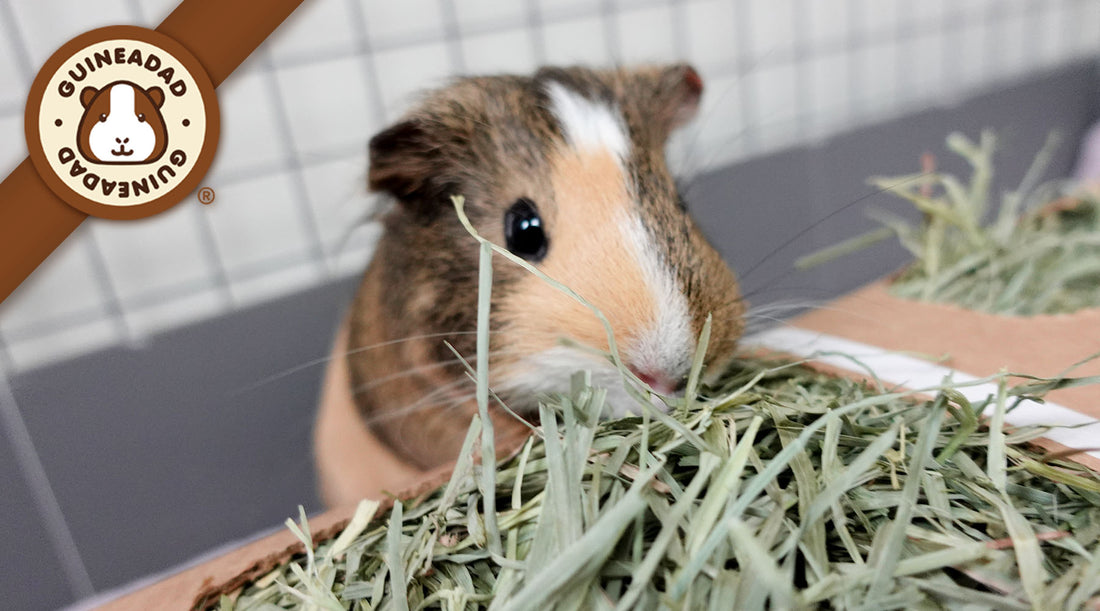A Guinea pig’s diet should consist mainly of fresh hay, vegetables, and a small portion of high-quality pellets. Fresh water must be available at all times.
Guinea pigs are herbivores that thrive on a diet rich in fiber and vitamin C. Fresh hay, such as Timothy hay, is essential for their digestive health and dental care. Vegetables like bell peppers and leafy greens provide necessary nutrients and variety.
High-quality pellets formulated for guinea pigs add balanced nutrition but should be given in moderation. Fresh water is crucial and should be available at all times to keep them hydrated. Avoid feeding guinea pigs sugary fruits, nuts, seeds, or processed foods. Maintaining a balanced diet ensures a healthy, happy guinea pig.

Credit: guineadad.com
Contents
Introduction To Guinea Pig Dietary Requirements
A balanced diet is crucial for guinea pigs’ health and longevity. Fresh hay, vegetables, and vitamin C-rich foods are essential. Ensure they always have clean water and avoid harmful foods.
Guinea pigs, with their charming personalities, are delightful pets. Ensuring they have a balanced diet is crucial for their health and happiness. Unlike many other small animals, guinea pigs have specific dietary needs that must be met to prevent health issues.
High-quality Hay
High-quality hay is vital for guinea pigs. It should form the bulk of their diet:
- Timothy hay: Most recommended, rich in fiber.
- Orchard grass: A soft, sweet-smelling alternative.
- Meadow hay: Varied mix, promotes foraging behavior.
Fresh Vegetables
Fresh vegetables are essential for providing vitamins and minerals:
- Leafy greens: Spinach, kale, and romaine lettuce.
- Bell peppers: High in vitamin C, a guinea pig’s necessity.
- Carrots: A tasty treat, but in moderation due to sugar content.
Vitamin C Supplements
Guinea pigs can’t produce vitamin C, so supplements are necessary:
- Vitamin C tablets: Reliable way to ensure intake.
- Liquid vitamin C: Can be added to water, though less stable.
- Vitamin C-rich foods: Bell peppers and leafy greens.
Fresh Water
Fresh water is a must-have for guinea pigs:
- Clean water: Ensure it is always fresh and available.
- Water bottles: Preferable over bowls to keep water clean.
- Daily checks: Replace water daily to ensure freshness.
Avoid Certain Foods
Some foods are harmful and must be avoided:
- Chocolate: Toxic to guinea pigs.
- Onions and garlic: Can cause digestive issues.
- Iceberg lettuce: Low nutritional value and can cause diarrhea.
By understanding and adhering to these dietary requirements, you can ensure your guinea pig enjoys a healthy and happy life.
The Importance Of Hay In Their Diet
Hay plays a crucial role in a guinea pig’s diet, providing essential fiber for digestion and dental health. Ensure unlimited access to fresh hay daily to support their well-being.
Hay is a cornerstone of a guinea pig’s diet. It provides essential nutrients, promotes dental health, and aids digestion. Let’s explore why hay is vital for these adorable pets.
Nutritional Benefits Of Hay
Hay is packed with essential nutrients. Here’s a breakdown of its key benefits:
- Fiber: Essential for digestive health.
- Vitamins: Supplies necessary vitamins like Vitamin C.
- Minerals: Provides calcium for strong bones and teeth.
Types Of Hay Suitable For Guinea Pigs
Choosing the right type of hay can make a significant difference. Here are some popular options:
- Timothy Hay: High in fiber, great for digestion.
- Orchard Grass: Sweet, soft, and perfect for picky eaters.
- Meadow Hay: A mix of grasses, providing variety.
How Much Hay Should They Eat?
Guinea pigs should have unlimited access to hay. It should make up the bulk of their diet. Always ensure a fresh supply.
Signs Your Guinea Pig Isn’t Getting Enough Hay
Watch for these signs to ensure your guinea pig is consuming enough hay:
- Weight Loss: Indicates poor nutrition.
- Dental Problems: Overgrown teeth suggest lack of hay.
- Behavioral Changes: Less active and more lethargic.
Storing And Handling Hay
Proper storage is crucial to maintain hay quality. Here are some tips:
- Cool, Dry Place: Prevents mold and preserves freshness.
- Airtight Containers: Keeps pests away and maintains quality.
- Regular Rotation: Use older hay first to avoid spoilage.
Common Mistakes To Avoid
Avoid these pitfalls to ensure your guinea pig enjoys the full benefits of hay:
- Using Hay as Bedding: Leads to contamination and waste.
- Inconsistent Supply: Always keep hay available.
- Poor Quality Hay: Choose high-quality, fresh hay.
Hay is an indispensable part of a guinea pig’s diet. Providing the right type, in adequate amounts, ensures they stay healthy and happy.
Understanding The Need For Vitamin C
Vitamin C is vital for guinea pigs to prevent scurvy and support overall health. Ensure their diet includes fresh fruits and vegetables rich in this essential nutrient.
Guinea pigs are delightful pets, but they have unique dietary needs. One of the most critical components of their diet is Vitamin C. This essential nutrient plays a significant role in their overall health and well-being. Let’s explore why Vitamin C is so crucial for your furry friend.
Why Guinea Pigs Need Vitamin C
Guinea pigs can’t produce Vitamin C on their own. This means they rely entirely on their diet to get this essential nutrient. Without adequate Vitamin C, they can develop scurvy, leading to severe health problems. Symptoms include lethargy, swollen joints, and a rough coat.
Sources Of Vitamin C In Their Diet
Ensuring your guinea pig gets enough Vitamin C involves providing the right foods. Here’s a list of great sources:
- Fresh vegetables: Bell peppers, kale, and broccoli are excellent.
- Fruits: Oranges, strawberries, and kiwi offer a tasty treat.
- Commercial pellets: Some are fortified with added Vitamin C.
How Much Vitamin C Do They Need?
It’s essential to know the daily requirement for your guinea pig. Generally, they need about 10-30 mg of Vitamin C per day. Factors such as age, health, and pregnancy can influence the exact amount needed. Always consult with your vet for a precise dosage.
Signs Of Vitamin C Deficiency
Recognizing a deficiency early can prevent serious health issues. Look out for these signs:
- Swollen joints: An indication of pain and discomfort.
- Lethargy: Your pet may seem unusually tired.
- Poor coat condition: A rough or dull coat signals trouble.
Supplements: Yes Or No?
Sometimes, food might not be enough. Here are some tips on using supplements:
- Consult your vet: Always get professional advice first.
- Use liquid supplements: These are easier to administer.
- Monitor intake: Ensure you don’t over-supplement.
Feeding Tips For Optimal Health
Maintaining a balanced diet is key. Incorporate these tips for the best results:
- Variety is vital: Rotate fruits and veggies to keep it interesting.
- Freshness matters: Always provide fresh produce daily.
- Avoid high sugar foods: Limit fruits to prevent obesity.
By understanding and catering to your guinea pig’s Vitamin C needs, you can ensure they lead a healthy, happy life. Keep their diet varied and consult your vet regularly to maintain optimal health.
Balancing Vegetables, Fruits, And Pellets
A balanced diet for guinea pigs includes a mix of vegetables, fruits, and pellets. This guide ensures optimal health for your furry friend. Proper nutrition supports their overall well-being and longevity.
Guinea pigs thrive on a balanced diet that combines vegetables, fruits, and pellets. Ensuring they get the right mix is crucial for their health and happiness. Let’s dive into how to create this balance effectively.
Vegetables: The Core Of Their Diet
Vegetables should form the bulk of a guinea pig’s diet. They provide essential vitamins and minerals.
- Leafy greens: Spinach, kale, and romaine lettuce are excellent choices.
- Bell peppers: High in vitamin C, which guinea pigs need daily.
- Carrots: A good source of beta-carotene, but offer in moderation.
- Cucumber: Hydrating and low in calories, making it a refreshing treat.
Fruits: Sweet Treats In Moderation
Fruits are delicious but should be given sparingly. They are high in sugar and can lead to obesity.
- Apples: Remove the seeds and core; they are a tasty snack.
- Strawberries: Rich in vitamin C but offer only occasionally.
- Blueberries: Antioxidant-rich, yet high in sugar.
- Oranges: Great vitamin C source, but too much can cause mouth sores.
Pellets: The Nutritional Backbone
Pellets provide a consistent source of nutrients and should be part of their daily intake.
Pellets should be specifically designed for guinea pigs. This ensures they contain the necessary vitamin C and other nutrients.
- Choose high-quality pellets: Look for those without added seeds or colored bits.
- Serve a small amount daily: About one-eighth of a cup per guinea pig.
- Store properly: Keep pellets in a cool, dry place to maintain their nutritional value.
- Monitor intake: Ensure they are eating their pellets and adjust portions if necessary.
By balancing these three components, you’ll ensure your guinea pig remains healthy and vibrant. Each element plays a critical role in their overall well-being.
Common Dietary Issues And How To Avoid Them
Guinea pigs often face dietary issues like vitamin C deficiency and overfeeding. Ensure a balanced diet of fresh vegetables, hay, and occasional fruits. Avoid sugary treats and provide clean water daily.
Feeding a guinea pig can be a delightful experience, but it’s crucial to know the common dietary pitfalls. By understanding these issues, you can ensure your pet stays healthy and happy.
Overfeeding Pellets
Guinea pigs love pellets, but too many can be harmful. Overfeeding pellets can lead to obesity and other health issues.
- Portion Control: Give only 1/8 cup of pellets daily.
- Nutrient Balance: Ensure pellets contain Vitamin C.
- Freshness: Store pellets in a cool, dry place.
Lack Of Vitamin C
Guinea pigs cannot produce Vitamin C. A deficiency can lead to scurvy, a serious condition.
A balanced diet must include Vitamin C-rich foods.
- Bell Peppers: High in Vitamin C and safe for guinea pigs.
- Leafy Greens: Offer kale or spinach for extra nutrients.
- Supplements: Consider Vitamin C drops in their water.
Unsafe Foods
Certain foods can be toxic or harmful to guinea pigs. Avoid these to keep your pet safe.
- Chocolate: Contains theobromine, which is toxic.
- Iceberg Lettuce: Can cause diarrhea.
- Seeds and Nuts: Risk of choking and high in fat.
Inadequate Water Intake
Proper hydration is crucial for a guinea pig’s health. Fresh water should always be available.
Monitor your pet’s water consumption.
- Fresh Water: Change it daily to keep it clean.
- Clean Bottles: Prevent algae and bacterial buildup.
- Accessible: Ensure the water bottle is within easy reach.
Inconsistent Feeding Schedule
A regular feeding schedule helps maintain a guinea pig’s digestive health.
- Consistency: Feed at the same times each day.
- Routine: Helps reduce stress and anxiety.
- Observation: Easier to spot any changes in eating habits.
By avoiding these common dietary issues, you can provide a balanced and nutritious diet for your guinea pig. This ensures a long, happy life for your furry friend.

Credit: www.oxbowaustralia.com
Frequently Asked Questions
What Do Guinea Pigs Eat Daily?
Guinea pigs need fresh hay, vegetables, and a small amount of pellets daily. Hay aids digestion, while vegetables provide essential vitamins. Pellets should be fortified with Vitamin C.
Can Guinea Pigs Eat Fruits?
Yes, but in moderation. Fruits are high in sugar, which can cause health issues if overconsumed. Offer small fruit pieces occasionally.
Are Pellets Necessary For Guinea Pigs?
Yes, pellets provide essential nutrients, especially Vitamin C, which guinea pigs cannot produce. Choose high-quality, guinea pig-specific pellets.
How Often Should I Feed Vegetables?
Vegetables should be fed daily. Offer a variety of fresh veggies to ensure balanced nutrition. Wash vegetables thoroughly to remove pesticides.
Conclusion
A balanced diet is crucial for your guinea pig’s health and happiness. Fresh vegetables, quality pellets, and hay should be staples. Always provide clean water and avoid harmful foods. By following these guidelines, you ensure your guinea pig thrives. Prioritize their diet, and you’ll enjoy a happy, healthy pet.



